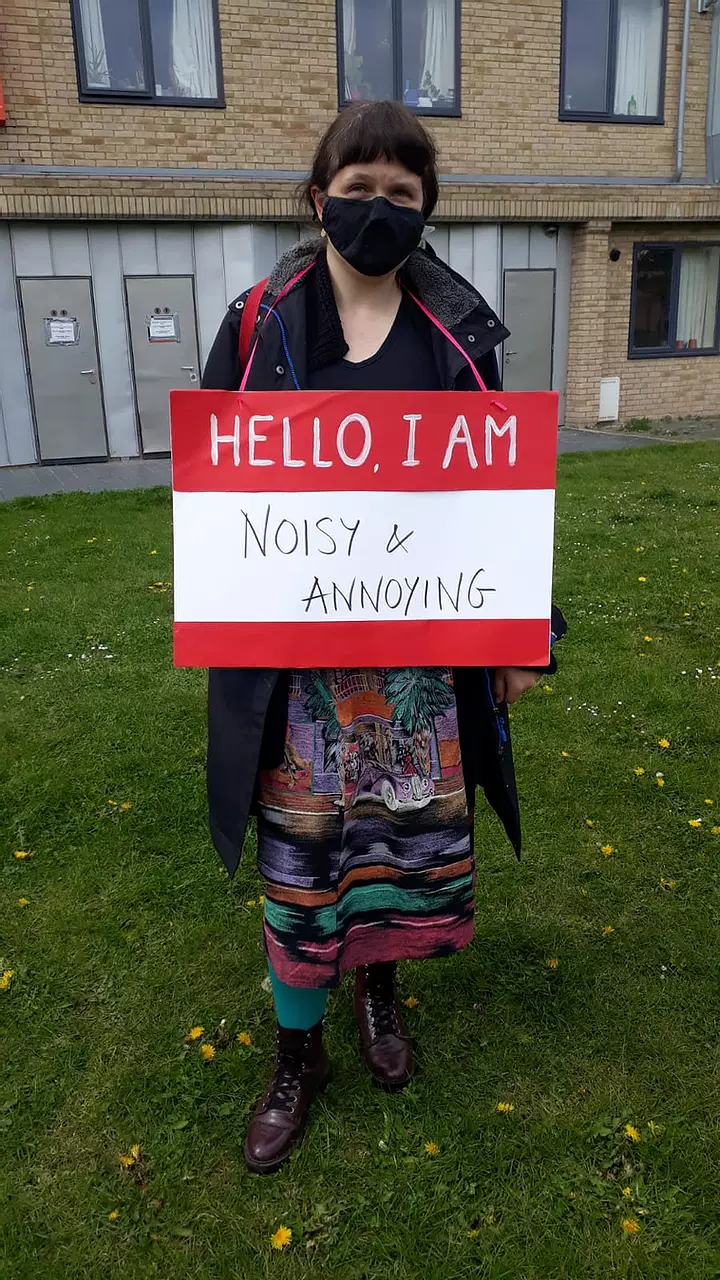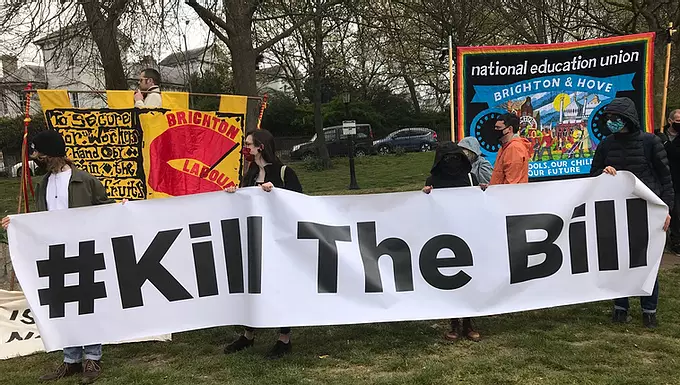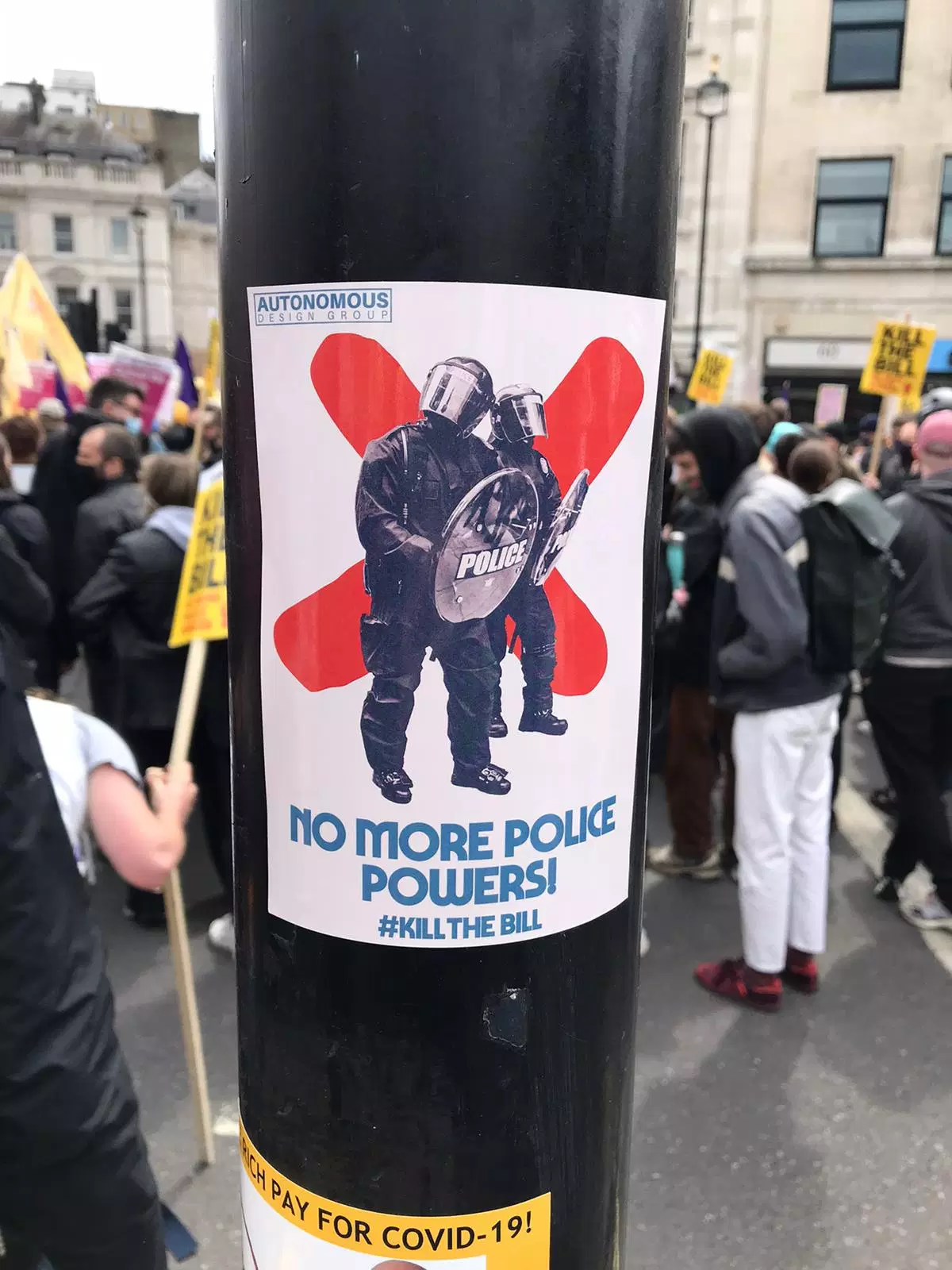With thousands out in Central London, hundreds in major cities and towns like Brighton, Bristol, Manchester, and Newcastle, and smaller protests in around 50 places altogether, the Kill the Bill Coalition has emerged as a major new campaigning force.
The protests everywhere were young, diverse, and vibrant. They brought together the widest range of organisations, from local trades councils and union branches to radical activist groups like Sisters Uncut, Black Lives Matter, and Extinction Rebellion.
In Central London, participants included Kurdish, Iranian, and Palestinian activists, the IWGB union of precarious workers, the London Renters Union, various women’s groups like Southall Black Sisters and Women Against Rape, as well as more mainstream labour movement organisations like local Labour parties, Momentum groups, and UNISON and RMT branches.

‘Who’ll defend the workers who cannot organise?’ asked Manchester care worker and union activist Ali Treacher. ‘Comrades, the answer must be each and every one of us. Solidarity! Happy Workers Day! We need to kill this Bill!’

‘Probably 150 people with lots of local interest,’ reported Oxford activist Jude Roberts. ‘A seriously broad range of groups represented. The sense of solidarity is powerful. Protesters began by taking the knee for 8 minutes and 46 seconds, before marching into the town centre chanting and singing and demanding that the PCSC Bill be killed. We are most definitely noisy and annoying!’

‘Good combination,’ according to Brighton socialist Dave Hill. ‘Trade unions, the trades council (who organised the demo), socialist groups, the Labour Party, together with Brighton Coalition Against the Bill, mainly young people … so experience and know-how combined with the vigour and anger and irreverence of radical youth.’
Can we win?
Yes. But it will not be easy, and what we have managed so far will not be enough.
We are up against two massive political forces. In trying to make sense of them, we use the concepts ‘global police state’ and ‘creeping fascism’.
William I Robinson’s concept ‘global police state’ concerns the huge worldwide increase in state spending on militarisation, police, prisons, borders, security, and surveillance. This is a huge source of profit for the private corporations that get the contracts. This creates a powerful vested interest – a modern ‘security-industrial complex’ with vast fortunes at stake.

But the global police state is also essential in a system racked by crisis, ecological and social devastation, and growing mass resistance. They need more police, more prisons, more hardware, more violence to crush dissent and keep the world safe for the super-rich.
William I Robinson’s concept of the global police state overlaps with our concept of creeping fascism. What we mean here is the shift on the political right to more extreme forms of authoritarianism, militarism, nationalism, racism, misogyny, homophobia, and attacks on minorities in general. The aim is to create a reactionary mass electoral base for capitalist regimes, with growing possibilities for mass mobilisation (against abortion, against vaccines, for Brexit, for Trump, etc), including armed fascist militias (like the ones who confronted BLM protests and stormed the Congress building in the States last year).
The Johnson regime
We cannot afford to underestimate the threat that this right-wing programme of police power and fascist-type politics represents. Let us take the example of the Tory Government in Britain.
It is led by a narcissist, opportunist, and serial liar who believes in nothing except his own career. He presides over a government mired in corrupt crony capitalism. His negligence, incompetence, and callousness indifference to human wellbeing has given Britain a ‘world-beating’ death toll of 130,000 from the Covid pandemic.
The ruling party, representing the super-rich, the speculators, and a smug middle class, has swung sharply to the right, waving a Brexit flag and peddling authoritarianism, the nationalism of the age of empire, and brutal anti-migrant racism laced with Islamophobia.
Despite this, the latest opinion polls have the Tories 11% ahead of Labour. This owes much to the spinelessness of Starmer, who has led a stampede to the right, turning the Labour Party into a standard-bearer for neoliberal corporate power and Brexit nationalism. But it is also a measure of the success of the Tory Party in following the example of the Republican Party in the States and turning itself into an extremist organisation that blurs, at its edges, into fascism.
This corrupt, reactionary, vicious regime will not easily be defeated. The system faces a deepening ecological and social crisis, and that means pro-system regimes like the Johnson Government face crises of legitimacy in the face of growing popular resistance. The drive towards fascism and a police state is – as we explain in System Crash – a direct consequence of the systemic crisis of world capitalism. The stakes are therefore very high.
What we must do
We have to turn the Kill the Bill Coalition from a mass movement of thousands into a mass movement of hundreds of thousands. We have to involve in the battle for democracy, forces large enough to do far more than simply be ‘annoying’ and ‘disruptive’ for a single day. We need forces with the power to stop the city – to block roads and railway lines, to occupy offices and public buildings, to shut down workplaces, and much more.

This cannot be done by thousands. It can be done by hundreds of thousands. A mass movement based on militant action across the whole of society could make the price the Tories must pay to enact the Bill too high. Anything less than this – or at least the threat of it – is unlikely to stop them.
We cannot build such a movement with semi-conspiratorial methods, restricting ourselves to communication on remote social-media platforms. We just cannot reach enough people that way. We have to use every outlet available to us to build a mass campaign and mass protests.
We need an alliance of hundreds of organisations, including not just campaign groups, but more mainstream organisations – local trade unions, local Labour parties, the Green Party, the SNP and Plaid, Momentum groups, student unions, and more. And these groups will need to have a voice, so we have to open up and create a more democratic structure for the Kill the Bill Coalition.
We are not yet living in a police state. We can still build a mass campaign in the open. We can still spread our message on all available platforms, in a multitude of media, so that we reach the widest possible number of people.
To win, we must reach out and turn the campaign we have launched from a movement of thousands into a movement of hundreds of thousands.

